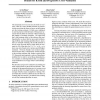Free Online Productivity Tools
i2Speak
i2Symbol
i2OCR
iTex2Img
iWeb2Print
iWeb2Shot
i2Type
iPdf2Split
iPdf2Merge
i2Bopomofo
i2Arabic
i2Style
i2Image
i2PDF
iLatex2Rtf
Sci2ools
104
click to vote
COLT
1999
Springer
1999
Springer
Beating the Hold-Out: Bounds for K-fold and Progressive Cross-Validation
The empirical error on a test set, the hold-out estimate, often is a more reliable estimate of generalization error than the observed error on the training set, the training estimate. K-fold cross validation is used in practice with the hope of being more accurate than the hold-out estimate without reducing the number of training examples. We argue that the k-fold estimate does in fact achieve this goal. Specifically, we show that for any nontrivial learning problem and learning algorithm that is insensitive to example ordering, the k-fold estimate is strictly more accurate than a single hold-out estimate on 1/k of the data, for ¢¤£¦¥§£©¨ (¥¨ is leave-one-out), based on its variance and all higher moments. Previous bounds were termed sanitycheck because they compared the k-fold estimate to the training estimate and, further, restricted the VC dimension and required a notion of hypothesis stability [2]. In order to avoid these dependencies, we consider a k-fold hypothesi...
| Added | 03 Aug 2010 |
| Updated | 03 Aug 2010 |
| Type | Conference |
| Year | 1999 |
| Where | COLT |
| Authors | Avrim Blum, Adam Kalai, John Langford |
Comments (0)

